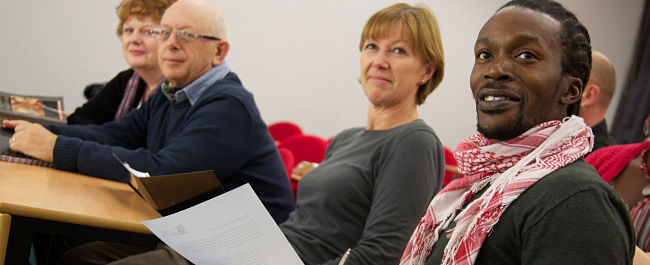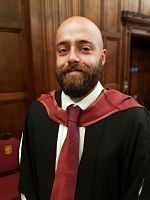Universities should be accessible to everyone, with lifelong learning at the heart of their work

This research, which draws on the authors’ experience of creating courses that recruit students without qualifications, offers practical policy solutions that would make universities more accessible and more responsive to a changing economy.
The need for lifelong universities
Despite the expansion of higher education since the 1960s, there are still deep inequalities in access to university. In the UK, nearly 75% of the richest 25- to 29- year olds had completed four years of tertiary education in 2008-14, but only 25% of the poorest.
We have also seen a dramatic drop in flexible forms of learning. Since 2010 there has been a 61% fall in the number of part-time students in England.
The decline in part-time study comes at a time when a fourth industrial revolution will create unprecedented demand on those already in work to retrain and acquire new skills.
A report by the World Economic Forum (WEF) in 2017 notes that: ‘Over one in four adults surveyed in the OECD reported a mismatch between their current skills and the qualifications required for their jobs. Furthermore, approximately 35% of the skills demanded for jobs across industries will change by 2020.’
In this context of rapid technological and economic change, it makes little sense to concentrate all of an individual’s higher education into a brief period at the beginning of their lives. We need a shift away from the norm of full-time study over three years at the age of 18. This model emerged in an era when the student population was dramatically smaller, and the nature of professional life was very different.
We need a radical rethink of the form and structure of the higher education system if this crisis is to be addressed.
Policy Report 42: November 2018
Contact the researchers
Professor Tom Sperlinger
Professor Josie McLellan
Professor Richard Pettigrew
"When I told one of my granddaughters that I was off to uni, she exclaimed, ‘but you’re not 18, Grandma!’"
Antonette Clarke-Aklanne was one of the first students on the Foundation Year in Arts and Humanities, starting her studies in 2013, and graduating with a 2.1 degree in Anthropology in 2018 at the age of 76
Policy recommendations
A new book by the lead researchers, Who are universities for? puts forward a new funding model for universities.
What would a different model of universities look like, and who would benefit? Our research makes four proposals.
Policy recommendations
• There should be a goal of full participation in further and higher education for all those over 18.
• Lifelong learning should become the norm, with most people studying part-time and able to pursue employment, care, or other activities alongside it. A modular structure would replace degrees, with people able to study for individual modules at different times of their lives and in different modes: one day per week within child-friendly hours, evenings, a series of weekend residentials, and online as well as face-to-face.
• Admissions to universities should be completely open for the first 60 credits of study, equivalent to half of the first year of undergraduate study. All those physically present in a country, including refugees and asylum seekers, would be able to access up to 60 credits of study in further/higher education on an open access basis and for free. Achievement in these 60 credits would count towards admission to routes beyond this.
• Communities should be involved in setting priorities. Half of university budgets would be decided through a participatory budgeting model in each region. This would require universities to consider the urgent questions arising in local communities each year as part of their curricula. This would ensure that all universities work much more closely with society on the challenges of the coming decades, including climate change, technology and the disruptions it will cause to existing patterns of life – including through growing inequality, movement of people, and the challenges of governance in a changing society. In order to understand and face these challenges, universities need to include a wide range of voices and perspectives.

"My friends and family were surprised I was able to do the course with everything else going on. As well as meeting people I never would have met otherwise, the course has given me more than I realised in terms of how I see myself and what I’m able to do. I now know I can do anything if I want to; it’s all about managing your time."
It was a busy six years for Hannah Mahoney. Over the course of her degree, she discovered she is dyslexic, changed jobs, bought her first house and gave birth to her first child.

"I have thoroughly enjoyed getting back into education; so much so that I’d really like to go on to do a Masters and then a PhD in Philosophy, with the overall aim of going into teaching. The Foundation Year is a brilliant opportunity which has opened so many doors to me. If, like me, you’ve written off any chance of undertaking a degree, give it a go – you might surprise yourself."
Discharged from the army at the age of 22 because of a previous back injury, Callum’s life plans suddenly changed. Having expected to spend the next 20 years in the military, and with no A-levels to fall back on, finding himself back on ‘civvy street’ was a bit of a shock. 26-year-old Callum Wallace achieved a 2:1 in Philosophy in 2017.
How would a new model of universities be funded?
• Initial study would be free for all. The first 60 credits of study (equivalent to half a year of undergraduate study) would be free as well as open access.
• University teaching would be funded by a participatory education tax. The fees and loans system would be replaced with an all-age graduate tax, called a participatory education tax (PET). It would be paid by all past graduates and all those who, in future, accumulated more than 60 credits. An individual would pay a slightly higher rate of tax after accumulating 240 credits of study (equivalent to two years of study).
• Half of the PET revenue would be distributed through a system of participatory budgeting. Of the funding provided via the PET tax, 50% would be distributed through a national system (in each devolved area), which would allow for the identification of strategic priorities across the sector, including in response to global challenges. The other 50% would be distributed through an annual participatory budgeting process in each region. This participatory budgeting model would be designed to ensure universities are accountable to communities and that those communities feel ownership of the knowledge that is produced in them.
A fully costed version of these proposals is included in ‘Who are universities for?’
I consider myself a lifelong learner, so there’s definitely more to come.
Examples of practice
The authors have set up two programmes at the University of Bristol that make lifelong access to education possible, use radical admissions models and involve close collaboration with a range of local communities.
BA English Literature and Community Engagement
This programme is taught one evening per week plus occasional Saturdays. Students range in age from early 20s to mid-70s, and most live locally. Many do not have prior qualifications, and some have been out of education for up to 50 years. Two-thirds of those admitted in 2016 were the first in their family to attend higher education.
As well as studying English literature, each student undertakes a community project, with up to 150 people per year taking part in a range of student-led reading groups and other activities.
Foundation Year in Arts and Humanities
The Foundation Year in Arts and Humanities is a one-year course designed to reach potential students without formal qualifications. Students’ ages have ranged from 18 to over 70 since the programme started in 2013. 90% of them did not have A-Levels.
The programme is structured around the question ‘What does it mean to be human?’, which introduces students to the full range of arts and humanities subjects. They also acquire a range of study skills, from note-taking and time management to essay writing and speaking in seminars.
The university has worked with a range of community partners, such as Single Parent Action Network (SPAN) and Bristol Refugee Rights, to develop taster courses that allow people to find out about the course and develop new skills.
So far, 90% of the 94 students who enrolled on the one-year course have completed it; 74 of those students have gone on to a degree. They are studying a wide range of subjects including Anthropology, History of Art, Liberal Arts, Film and Television, and Childhood Studies.
9 out of 10 of those completing a degree have graduated with a First or 2.1 degree.
Further information
To find out more about this research, visit the publisher’s website for 'Who are universities for?' bristoluniversitypress.co.uk/who-are-universities-for
To find out more about the Foundation Year in Arts and Humanities: bristol.ac.uk/arts/study/foundation/
To find out more about the BA English Literature and Community Engagement: bristol.ac.uk/english/study/part-time/elce-course/
Authors
Professor Tom Sperlinger, Professor Josie McLellan, Professor Richard Pettigrew: University of Bristol
Related briefings
The Government’s Progress 8 school performance measure needs to account for pupil background
